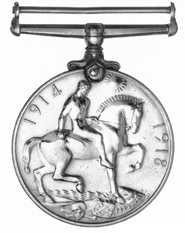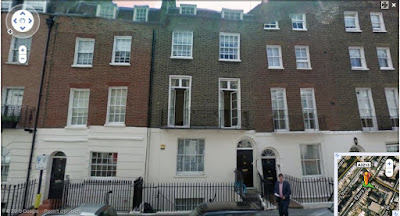
We know that Arthur Frederick Hobart Mills was trained to be a soldier. After attending Wellington College [1900-1903], he then spent time at the Royal Military Academy at Sandhurst. From there, Mills was "gazetted" [the army apparently prefers the term "commissioned"] directly into the 3rd Battalion of the Duke of Cornwall's Light Infantry on 18 September 1908 as a second lieutenant.
On 5 August 1914, Arthur was promoted to the rank of Captain and called to France after Britain declared war on Germany on 3 August. He was wounded in battle in both legs and disembarked to Freshwater on the Isle of Wight for surgery on his legs on 15 September 1914. Mills returned to his battalion, according to records, on 24 September 1914.
Afterwards, apparently around 7 December 1914, the Lieutenant Colonel commanding the 3rd Battalion recommended Mills for the 1914 Star. He was soon awarded the British War Medal and the Inter-Allied Victory Medal, the three being known colloquially as "Pip, Squeak, and Wilfred [all pictured throughout]" There is a notation on Arthur's medal card that appers to have been added later and reads: "Extracted from Officer's Roll. 15.3.21 EF/9." Uncertain what that means, I've tried to determine what many of the other obscure notations on the medal card actually mean, but I've not come up with much. My hunch, however, was that it meant that he left the service on 15 March 1921, but other evidence makes me uncertain.
There is a notation on Arthur's medal card that appers to have been added later and reads: "Extracted from Officer's Roll. 15.3.21 EF/9." Uncertain what that means, I've tried to determine what many of the other obscure notations on the medal card actually mean, but I've not come up with much. My hunch, however, was that it meant that he left the service on 15 March 1921, but other evidence makes me uncertain.
Arthur Mills would write a book about his wounding called With My Regiment: From the Aisne to La Bassée [Lippincott: Philadelphia, 1916], and follow that up with a sequel called Hospital Days [T. Fisher Unwin: London, 1916], which I've discussed in another entry. It's autobiographical, but doesn't encompass all of his service in WW I.
There's a bit more on Arthur's First World War action in Lady Dorothy Mills's autobiography, A Different Drummer: Chapters in Autobiography [Duckworth:  1930]: "My husband of a year [who] had already been severely wounded in France went out to serve in the Palestine campaign."
1930]: "My husband of a year [who] had already been severely wounded in France went out to serve in the Palestine campaign."
But it's only a little bit more, because that's all she wrote. Period.
We don't know when Arthur left the military, but what appears to have been his first novel, Ursula Vanet, hit the bookshelves in 1921. Before that, Mills had sole newspaper and magazine articles, some of which were collected into his book, With My Regiment.
Publishing his first novel in 1921 makes sense, especially if his departure from the military did, indeed, occur early in 1921. By July, Ursula Vanet was being reviewed relatively favorably in Punch, volume 161, p. 20. From that year, Mills released at least one book a year, often two, through 1940's publication of White Negro.
Oddly, the London Times on 12 June 1937 carried a snippet from the London Gazette reading: "MILITIA. 3rd. Bn. D.C.L.I.—Capt. A. F. H. Mills relinquishes his commn. and is granted the hon. rank of Maj. (June12)." It's difficult to unravel all of the the Byzantine agate headings, subheadings, and indentations exactly, but apparently relinquishing his commission may have had something to do with him turning 50 on 12 July of that same year. Somehwere in the text above, reserve officers were stricken from the roll under the instructions: "The follg. having attained the age limit of liability to recall, cease to belong to the Res. of Off.:—"
It's difficult to unravel all of the the Byzantine agate headings, subheadings, and indentations exactly, but apparently relinquishing his commission may have had something to do with him turning 50 on 12 July of that same year. Somehwere in the text above, reserve officers were stricken from the roll under the instructions: "The follg. having attained the age limit of liability to recall, cease to belong to the Res. of Off.:—"
In 1939, after having been put out in to pasture, Mills was "gazetted" yet again. The London Times on 7 September 1939 carried a story entitled "LAND FORCES" [of the Territorial Army], and stated: "The follg. to be granted Emergency Commissions as Sec. Lts. (September 3)." Found within the hundreds of names is this one: "A. F. H. Mills."
The London Gazette followed that on 12 December 1939 with a less-than-timely pronouncement in a section entitled "SPECIAL LIST" reading: "The undermentioned from Army Officer's Emergency Reserve to be 2nd Lts. 2nd September 1939:— A. F. H. Mills (98184)."
But it wasn't to be. In the 1 March 1940 London Gazette, in a section called "SPECIAL LIST," three consecutive listings read, in order: "The personal number of 2nd Lt. A. F. H. Mills is 43673, and not as notified in the Gazette of 15th Dec.1939.
"The personal number of 2nd Lt. A. F. H. Mills is 43673, and not as notified in the Gazette of 15th Dec.1939.
The notifn. regarding Maj. A. F. MILLS (43673) in the Gazette of 9th Sept. 1939 is cancelled.
Lt. Arthur Frederick Hobart Mills (43673) relinquishes his comm. 10th Sept. 1939."
Strangely, 1937 and 1939 weren't the first times Arthur Mills had relinquished a military commission. Back in 1914, an entry in the London Gazette of 3 February reads: "Duke of Cornwall's Light Infantry, Lieutenant Arthur F. H. Mills resigns his commission. Dated 4th February, 1914."
Even more strangely, the same issue of the Gazette features this entry: "Duke of Cornwall's Light Infantry, Arthur Frederick Hobart Mills, late lieutenant, the Duke of Cornwall's Light Infantry, to be lieutenant, with seniority as from 20th September, 1910. Dated 4th February 1914."
I guess it all worked out since he was embarked to France in August 1914. There must have been some sort of issue about Arthur's promotion [or lack of one] to lieutenant that was at issue as his seniority was back-dated almost four years, and three months later he commanded a platoon in France as a Captain!
On 4 July 1916, the Gazette, in a section called "COMMANDS AND STAFF" announced: "The following appointments are made: "SPECIAL APPOINTMENTS. (Graded for Purposes of Pay as G.S.O., 3rd Grade) Capt. A. F. H. Mills, D. of Corn. L. I., Spec. Res. 3rd May 1916." Arthur Mills had just married Dorothy Rachel Melissa Walpole at St. Paul's Church in Knightsbridge in the spring of 1916. The additional pay would have been welcome as, apparently, officers were not particularly well-paid at the time. Lady Dorothy describes their situation in 1916 as having "no money, scarcely enough to pay for the wedding celebrations."
Arthur Mills had just married Dorothy Rachel Melissa Walpole at St. Paul's Church in Knightsbridge in the spring of 1916. The additional pay would have been welcome as, apparently, officers were not particularly well-paid at the time. Lady Dorothy describes their situation in 1916 as having "no money, scarcely enough to pay for the wedding celebrations."
Mills apparently also had little in the way of savings or anything from his family. Lady Dorothy also writes that in 1913: "I fell in love with a young man possessing most of the world's assets except money. But that "Except" had a capital "E." It was the one unforgivable sin…"
As one checks the dates here—1913, meet Dorothy; 1914, threaten to relinquish commission to get promotion and more money... and, 1916, marry the disinherited Lady Dorothy who had no trousseau; 1916, promotion to General Staff Officer, 3rd Grade, for purposes of pay—one can see that behind every great man, there is a woman who probably needs more money. It wasn't until after their wedding that Lady Dorothy learned to economize—doing her own hair and lacing up her own shoes—and even going out to find work while Arthur was overseas.
It's unknown at this point how long Arthur Mills stayed in the D.C.L.I., and when exactly he took up a place at 91A Ebury Street as a full-time writer, but it's probably safe to say that living between Lady Dorothy and the Militia wasn't as safe and easy as Mills might've wanted. There's another listing for A. F. H. Mills in the London Gazette on 9 October 1919. Perhaps it indicates financial times had been finally improving for the couple: "COMMANDS AND STAFF. The undermentioned relinquish their appointments:— Cl. FF.—Capt. A. F. H. Mills, D. of Corn. L. I., Spec. Res. 3rd June 1919."
But, if that's the case and Mills left the service, there's then a puzzling entry in the Gazette dated 14 July 1922, ostensibly after Arthur had been a civilian again for over three years, that is quite cryptic to me. While we know he was promoted to Captain in 1914 and G.S.O. 3rd Class in 1916, this 1922 citation reads: "3rd D.C.L.I.—Capt. A. F. H. Mills, from Supplementary List, to be Capt. 15th July 1922, with seniority 5th Aug. 1914."
Had Arthur left, and then returned briefly to, the military in 1922? Or had there simply been a problem with his commission after leaving? Again, something about this smacks of a money issue here.
By 1922, Arthur had published four books, including Ursula Vanet [about a lad from Sandhurst and a society girl who makes the wrong friends] in 
Arthur would write three more novels in 1923-1924, so I find it hard to believe he returned to the armed forces for any length of time. Is it possible, though, they still didn't have nearly enough money and were poking at the Army for more? Or was it that they simply did not have enough to meet their current "needs"? Lady Dorothy doesn't appear to have missed very many society balls during the early 1920s—largely without Arthur along in attendance.
It just seems quite odd to me that Arthur Mills, trained as a soldier as a youth, and an officer and a gentleman as a young man, a veteran of foreign wars and a verifiable hero, presumably from 1908 to through approximately 1920, simply couldn't support himself and a wife on a captain's salary.
His uncle, Dudley Mills, who was a Major in the Royal Engineers at the time, had a wife and five children by 1908. How little money could Captain Arthur have been sending home in 1916?
There are some clues in Arthur's 1930 novel The Apache Girl, but it's a work of fiction. Still, it's informative.
One wonders, though, if being an officer in the British Army was actually a living for a young couple, circa 1913-1919. My guess is that it was—but the evidence doesn't fully explain why Arthur and Dorothy couldn't seem to get by on his commission.
Any ideas? Would his pay rate have been a 'living wage' for a husband and wife at the time? Please let me know!


![Meredith and Co. [1933] by George Mills](https://blogger.googleusercontent.com/img/b/R29vZ2xl/AVvXsEjlUeRNPnH8Xd8JT59QdtabQHRI6DI6Hqew57i6qixjOL3LjgUD9g22o3-wNlmBya36D5-6KZXX-sxLnktAfEqjlvTmdwyiIL2K6VHOGW2Wq9Pe8_oFGknENfVE1Xrkdj0b8FYXTz_6SMg/s1600-r/sm_meredith_1933.JPG)
![King Willow [1938] by George Mills](https://blogger.googleusercontent.com/img/b/R29vZ2xl/AVvXsEgiz_iaQjinIbVw6yQ-W4hwx6wGJwMQH9azCs3Qacp9eX627B7Eq9hMn1wlHLzlkbcflHRWM8VcPX-1uteKbs4LA5q5Oq69WhrnhzBQLjpseK_M34PSoOOhTZ96EfVAGFehG53gZ0M4EvU/s1600-r/sm_1938.JPG)
![Minor and Major [1939] by George Mills](https://blogger.googleusercontent.com/img/b/R29vZ2xl/AVvXsEgH5nj4Q6BNpzVEb1vyJeGV6ikuN4SFAyDa-jypIgbvdrxqcjHkNxqjrXH7ptZmge7oTTpn5QjAI0yCJPdI-fIzooCDD1TAA3RDxO9jzLcU3QOIhBWKiKNz6CPjCSTZgIPd9_4zM7LLpAw/s1600-r/sm_1939.JPG)
![Meredith and Co. [1950] by George Mills](https://blogger.googleusercontent.com/img/b/R29vZ2xl/AVvXsEgm_JPAXPpX0wb8bDkjYG67Sg1HePiPhRP6b9oUMWvkJhiW6XJzmxTQ7TBepfxpPgRrFNCRuumYRj-SAfU9Kw-uDsbO5HBtyxfQfClHVMJxJUkDpbkrCPhzpC4H_g_ctlirgnSla4vX1EQ/s1600-r/sm_1950.JPG)
![Meredith and Co. [1957?] by George Mills](https://blogger.googleusercontent.com/img/b/R29vZ2xl/AVvXsEg0zRm3-CCmA8r2RrBmrACDvmxJjoBjfxUoPI9yc6NWu1BZ3dd89ZvCixmmKZe1ma0QiDIrsDZNqf-8h1egh0JLiRYHagXAqQ1UknWPy6SksK76psYPcEMLGa_Aj7wo2vMFPo0aMdcx_pg/s1600-r/sm_meredith.JPG)













No comments:
Post a Comment